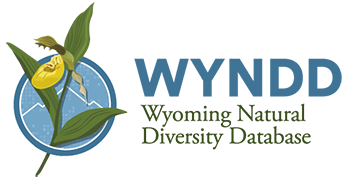The final portion of the morning session involved representatives of major partner groups – U.S. Forest Service, Bureau of Land Management, U.S. Fish and Wildlife Service, Natural Resources Conservation Service, and Wyoming Game and Fish Department - providing updates on their organizational priorities and initiatives, which drew 120-130 remote participants.
From 1 – 2pm Gary Beauvais provided a demonstration of the WYNDD Data Explorer, highlighting new features alongside previously-available functionality. Fifty-one participants attended the demonstration, with several establishing new user-accounts during the session.
From 2 – 3pm Lusha Tronstad hosted a meeting of the Wyoming Pollinator Working Group, with presentations by several WYNDD researchers and a discussion of research and management needs concerning pollinating insects in Wyoming and the west. Fifty-three people participated in this session.
From 3 – 4pm Ellen Whittle and Daniel Batie presented a discussion of acoustic analysis for bat researchers, touching on important aspects of equipment, field methods, analytical options, and best-approaches to working with acoustic data. Forty-five participants were involved.
Also from 3 – 4pm Lusha Tronstad led a discussion of aquatic ecology and freshwater invertebrates, including mussels and snails, with a focus on current knowledge gaps, management, and needed research. Seventeen people attended this discussion.
All sessions were recorded – please use the links below to access the recordings. And please plan to join us in 2026!
Resources & Links
Videos:
Slideshows (PDF Format):

